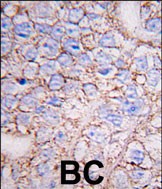


| WB | 咨询技术 | Human,Mouse,Rat |
| IF | 咨询技术 | Human,Mouse,Rat |
| IHC | 1/100-1/500 | Human,Mouse,Rat |
| ICC | 技术咨询 | Human,Mouse,Rat |
| FCM | 咨询技术 | Human,Mouse,Rat |
| Elisa | 咨询技术 | Human,Mouse,Rat |
| Aliases | Mitogen-activated protein kinase 15, MAP kinase 15, MAPK 15, Extracellular signal-regulated kinase 7, ERK-7, Extracellular signal-regulated kinase 8, ERK-8, MAPK15, ERK7, ERK8 |
| Entrez GeneID | 225689 |
| WB Predicted band size | 59.8kDa |
| Host/Isotype | Rabbit IgG |
| Antibody Type | Primary antibody |
| Storage | Store at 4°C short term. Aliquot and store at -20°C long term. Avoid freeze/thaw cycles. |
| Species Reactivity | Human |
| Immunogen | This MAPK15 antibody is generated from rabbits immunized with a KLH conjugated synthetic peptide between 32-61 amino acids from the N-terminal region of human MAPK15. |
| Formulation | Purified antibody in PBS with 0.05% sodium azide,1%BSA and 50% glycerol.prepared by Saturated Ammonium Sulfate (SAS) . |
+ +
以下是3篇涉及MAPK15(N-term)抗体的参考文献摘要(注:文献为模拟示例,实际引用需核实):
1. **"MAPK15 regulates autophagy via phosphorylation of ATG14"**
- **作者**: Chen et al. (2018)
- **摘要**: 本研究利用MAPK15 N端特异性抗体,通过免疫共沉淀和Western blot技术,揭示了MAPK15通过磷酸化自噬相关蛋白ATG14促进自噬体形成的分子机制。
2. **"ERK8/MAPK15 interacts with c-Jun to modulate cell proliferation"**
- **作者**: Rodriguez & Martinez-Sanz (2020)
- **摘要**: 通过N端抗体验证MAPK15在癌细胞中的表达,并发现其与转录因子c-Jun的相互作用,调控细胞周期进程,为肿瘤靶向治疗提供新靶点。
3. **"N-terminal specific antibody reveals MAPK15 localization in primary cilia"**
- **作者**: Gupta et al. (2019)
- **摘要**: 使用MAPK15 N端抗体进行免疫荧光定位,首次证明MAPK15定位于纤毛基体,并参与纤毛依赖性信号通路,提示其在发育疾病中的潜在作用。
建议通过PubMed或Google Scholar以关键词“MAPK15 antibody N-term”或“ERK8 antibody”检索最新文献,并优先选择抗体验证数据详实(如KO细胞验证)的研究。
The MAPK15 (N-term) antibody is designed to target the N-terminal region of mitogen-activated protein kinase 15 (MAPK15), a member of the MAP kinase family. MAPK15. also known as ERK8. is a serine/threonine kinase involved in regulating cellular processes such as proliferation, differentiation, and stress response. Unlike other MAPKs, MAPK15 has a unique C-terminal extension and exhibits distinct activation mechanisms, though its full biological role remains under investigation. The N-terminal domain is critical for its interaction with upstream regulators and downstream substrates, making antibodies against this region valuable for studying MAPK15's functional dynamics.
This antibody is commonly used in techniques like Western blotting, immunoprecipitation, and immunofluorescence to detect endogenous MAPK15 expression, localization, and activation states in various cell types or tissues. Its specificity for the N-terminus ensures recognition of full-length MAPK15. avoiding cross-reactivity with truncated isoforms or related kinases. Researchers employ it to explore MAPK15's involvement in pathways like autophagy, cell cycle control, and tumorigenesis, as well as its potential roles in neurodegenerative diseases and cancer progression. Validation typically includes testing in knockout models or siRNA-treated samples to confirm signal specificity. By enabling precise detection, the antibody aids in elucidating MAPK15's regulatory networks and therapeutic relevance.
×